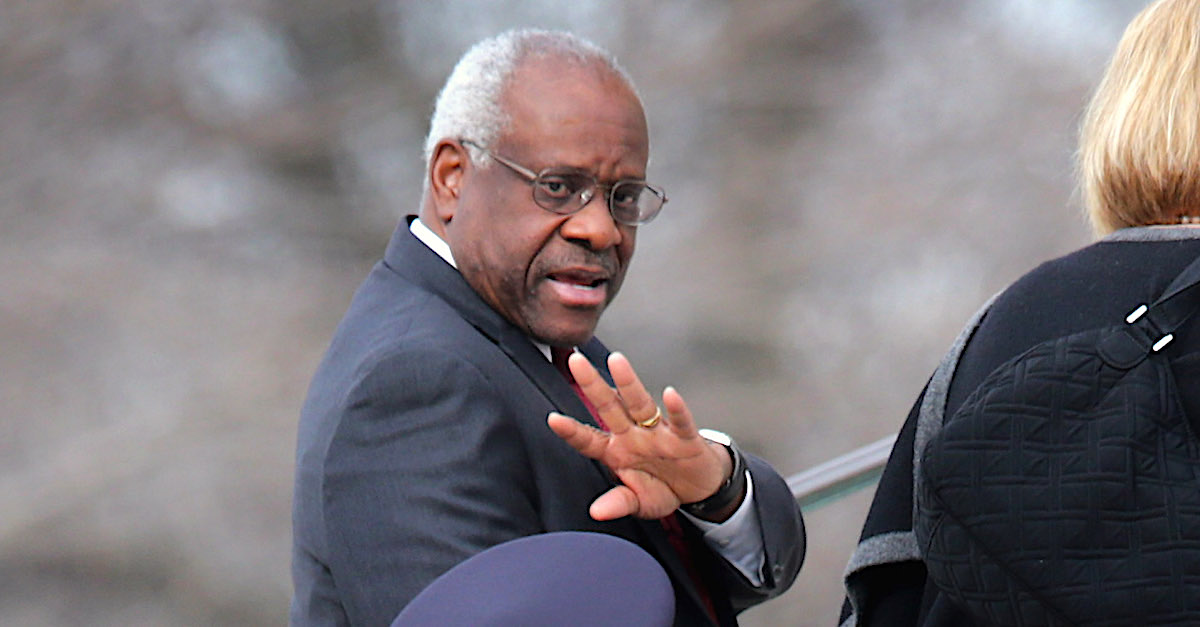
U.S. Supreme Court Justice Clarence Thomas took aim at the law under-girding the state of the internet as we know it in an opinion related to an order released Tuesday morning.
Section 230 of the Communications Decency Act (CDA) of 1996 is a provision in federal law that effectively has nothing to do with indecency whatsoever–thanks to the Supreme Court’s First Amendment rulings. The relevant provisions of the statute have long been deemed even “Better Than the First Amendment” by legal scholars because of their expansive online speech protections.
Texas A&M University School of Law Professor Brian Holland noted that 230 protections mean “no interactive computer service should be treated as the publisher or speaker of third-party content, and that efforts to moderate content should not create such liability.”
Politicians right and left, however, are at times affronted when vibrant free speech is allowed in this country and especially when liability for such speech is all-but foreclosed against. President Donald Trump has railed against Section 230’s liability shield for years–once issuing a legally meaningless executive order in an effort to project an image of opposition to the law–and even former vice president Joe Biden has called for an end to the statute’s fulsome protections.
Justice Thomas, taking his cues from the 45th president and the GOP’s recent vintage disapproval of Section 230, took the time out to stand up and be counted as part of the rising bipartisan consensus against destroying the current incarnation of the internet.
The case stylized as Malwarebytes, Inc. v. Enigma Software Group USA, LLC was briefly addressed in Thomas’s dicta as an admitted opportunity to opine about the fundamental internet law.
“I agree with the Court’s decision not to take up this case,” the conservative justice noted in his agreement to deny certiorari. “I write to explain why, in an appropriate case, we should consider whether the text of this increasingly important statute aligns with the current state of immunity enjoyed by Internet platforms.”
Thomas questioned the liability protections that lower courts have enlarged and developed into the case law that protects internet service providers–and most of the speech on the internet–today.
“Adopting the too-common practice of reading extra immunity into statutes where it does not belong, courts have relied on policy and purpose arguments to grant sweeping protection to Internet platforms,” the opinion said before cataloguing several disagreements.
Per the opinion [emphasis in original]:
Courts have discarded the longstanding distinction be- tween “publisher” liability and “distributor” liability. Al-though the text of §230(c)(1) grants immunity only from “publisher” or “speaker” liability, the first appellate court to consider the statute held that it eliminates distributor liability too—that is, §230 confers immunity even when a company distributes content that it knows is illegal. [In a case stylized as Zeran v. America Online, Inc.] In reaching this conclusion, the court stressed that permitting distributor liability “would defeat the two primary purposes of the statute,” namely, “immuniz[ing] service providers” and encouraging “selfregulation.” And subsequent decisions, citing Zeran, have adopted this holding as a categorical rule across all contexts.
To hear Thomas tell it, the Congress never intended for this blurred distinction to take root as a legal standard and the nation’s high court should, at some point in the future, curtail this practice.
The archconservative jurist also argued that internet service providers should not be entitled to immunity for any self-produced content because the original statute says that immunity extends to content “provided by another information content provider.” Section 230 is silent on self-produced content in this regard.
Thomas’s opinion further protested lower court rulings that extended liability to companies that provided sex workers the ability to advertise their services, a Facebook algorithm that allegedly recommended “content by terrorists” and dating apps that allowed users to harass one another. In these cases, the justice argued, the plaintiffs were arguing that each website suffered from product design flaws but courts dismissed their claims due to the strong liability shield–Thomas thinks the plaintiffs should have had their day in court.
“Paring back the sweeping immunity courts have read into §230 would not necessarily render defendants liable for online misconduct,” the opinion continues. “It simply would give plaintiffs a chance to raise their claims in the first place. Plaintiffs still must prove the merits of their cases, and some claims will undoubtedly fail. Moreover, States and the Federal Government are free to update their liability laws to make them more appropriate for an Internet-driven society.”
[Image via Chip Somodevilla/Getty Images]
Have a tip we should know? [email protected]